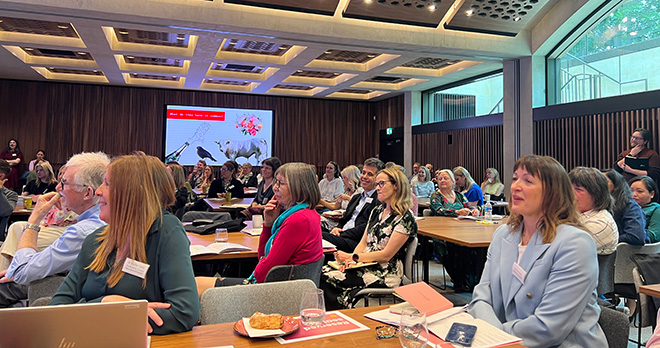What you need to know about the Court of Protection and deputyships.

Here our Compensation Protection team explains what you might need to know about the Court of Protection and deputyships.
What is the Court of Protection?
The Court of Protection is a specialist court in England and Wales that makes decisions on behalf of individuals who lack the mental capacity to make decisions for themselves. These decisions can relate to their property and financial affairs and/or their health and welfare.
What is a deputy?
A deputy is a person appointed by the Court of Protection to make decisions on behalf of someone who no longer has the mental capacity to make those decisions themselves. This lack of capacity might be due to conditions such as dementia, a severe brain injury, a learning disability, or a serious illness.
A deputy acts under the authority of the court and must always act in the best interests of the person they represent.
There are two main types of deputies:
- Property and Financial Affairs Deputies: These deputies can manage bank accounts, pay bills, collect benefits or pensions.
- Health and Welfare Deputies: These are less common and are appointed in situations where ongoing decisions need to be made about the person’s medical treatment or care arrangements. The Court will only appoint a Health and Welfare deputy when there is no other way to resolve ongoing issues.
Who Can Be a deputy?
- Individuals: Usually family members or close friends.
- Professionals: Such as solicitors are often appointed when there are complex financial matters or no suitable family members.
- Local Authorities: In situations where there is no one else available to act.
In addition to individual professional deputies, such as solicitors , a Trust Corporation can also be appointed as a professional deputy. A Trust Corporation is authorised to act as a deputy, usually in cases involving the management of substantial assets or more complex estates. Trust Corporations are highly regulated and subject to strict oversight, ensuring they adhere to the standards set by the Office of the Public Guardian (OPG).
Please refer to ‘Supervision’ below.
Becoming a deputy.
Becoming a deputy is a significant responsibility. You must be over 18, demonstrate that you’re suitable for the role, and be willing to comply with the Mental Capacity Act 2005 and any directions from the Court or the Office of the Public Guardian (OPG). You will also be supervised by the OPG, and depending on the complexity of the case, you may be required to submit annual reports detailing the decisions you’ve made and how funds have been managed.
A deputy is not free to make decisions as they please. They must:
- only act within the scope of authority given by the Court;
- involve the person they are representing as much as possible;
- keep records and receipts;
- avoid conflicts of interest;
- always act in the person’s best interests, with care and consideration.
If more than one person is appointed, the Deputyship Order will state whether decisions must be made jointly or jointly and severally (individually or together), which affects how responsibilities are shared.
How is a deputy different to an LPA?
A Lasting Power of Attorney (LPA) is set up before a person loses capacity, allowing them to choose who they want to act on their behalf. A deputyship, in contrast, is only established after a person has lost capacity and can no longer make that decision themselves. In such cases, the Court of Protection decides who is best suited to be appointed.
Mental capacity.
Mental capacity is a person’s ability to make a specific decision at the time it needs to be made. It’s not an “all or nothing” concept — someone may be able to make certain decisions (like what to wear or eat), but not others (like managing their finances or agreeing to medical treatment). Under the Mental Capacity Act 2005, a person is assumed to have capacity unless it is proven otherwise.
A deputyship is only necessary when someone lacks mental capacity to make decisions in a particular area of their life, and they did not put in place a Lasting Power of Attorney beforehand.
Before a deputy can be appointed, the Court of Protection must be satisfied—through medical evidence—that the person lacks capacity to make decisions for themselves in that area. This involves a mental capacity assessment, usually completed by a GP or another professional familiar with the person’s condition.
The guiding principle is always the person’s best interests.
How it works in practice.
In practice, the deputies must meet with an individual, analyse and reflect on whether they can make the decision themselves and, if not – taking into account the circumstances and views of the individual and those close to them – make a best-interest decision. This process can be complex and requires proper time allocated to it. We are experienced in supporting brain injury survivors to participate in financial decisions, and understand the importance of taking time during meetings, and using prompting and visual aid techniques, to ensure as far as possible that clients and their families are supported and involved in discussions.
In our experience, some individuals will lack capacity concerning all of their financial affairs but others retain some capacity. It is for the deputies to establish the areas of capacity and the extent to which the client can make decisions themselves, and ensure that they do not trespass there. This requires time to be spent getting to know the client and developing a trusting relationship.
Determining client capacity and making decisions.
The legal process that goes into determining capacity all stems from The Mental Capacity Act 2005. This Act also provides a detailed framework that is designed both to empower and protect vulnerable people; the philosophy behind the legislation being that those who suffer a disability shall be assisted to live normal lives and make as many choices about their lives as possible.
Section 2 of the Mental Capacity Act sets out the definition of capacity as:
“a person lacks capacity in relation to a matter if, at the material time, he is unable to make a decision for himself in relation to the matter because of an impairment of, or a disturbance in, the functioning of, the mind or brain”.
The matter of whether someone has capacity is therefore individual, time and issue-specific.
The five key principles when determining capacity.
It is also important to have in mind that the Act is very much intended to enable incapacitated people and (as Section 1 of the Act requires) the following five guiding principles apply:
- a person must be assumed to have capacity unless it is established that he lacks capacity;
- a person is not to be treated as unable to make a decision unless all practical steps to help him to do so have been taken without success;
- a person is not to be treated as unable to make a decision merely because he makes an unwise decision;
- an act done, or decision made, under the Act, for or on behalf of a person who lacks capacity must be done, or made, in his best interests;
- before the act is done, or the decision is made, regard must be had to whether the purpose for which it is needed can be as effectively achieved in a way that is less restrictive of the person’s rights and freedom of action.
Before incapacity can be determined, Section 3 of the Act sets out that it is necessary to show that the individual is unable:
“(a) to understand the information relevant to the decision;
(b) to retain that information;
(c) to use or weigh that information as part of the process of making the decision; or
(d) to communicate his decision (whether by talking, using sign language or any other means)”.
The key responsibilities of a deputy.
Deputies are appointed by an Order of the Court of Protection and are closely supervised by the Office of the Public Guardian. Every deputy must act in accordance with the principles of the Mental Capacity Act 2005.
A deputy will collaborate with clients and their family members to obtain all the different viewpoints, ensuring each decision is made in the best interests of the individual who lacks capacity.
The Order appointing the deputy will give them the authority to make a range of decisions, however there are certain decisions which will require a further application to the Court of Protection. These can include provision to:
- buy or sell property;
- proceed with non-standard investments (buy-to-let / holiday properties, ethical investments etc.);
- make statutory Wills;
- make Re ACC applications;
- make gifts.
In addition to their legal duties, all deputies must adhere to the 2023 OPG deputy Standards, which outline what constitutes good practice in the role. These standards focus on:
- understanding your role and legal responsibilities, ensuring compliance with the Mental Capacity Act 2005 and other relevant legislation, and acting within the scope of the deputyship order;
- making decisions in the best interests of the person, ensuring they are involved as much as possible in decisions that affect them, and considering their wishes, beliefs, and values when making decisions;
- managing finances and property responsibly, keeping accurate and up-to-date records, providing clear evidence of all transactions, and maintaining a transparent audit trail;
- transparency and accountability, including submitting annual reports to the Office of the Public Guardian (OPG), explaining actions taken and decisions made. Deputies must also ensure that relevant stakeholders, such as family members and carers, are kept informed where appropriate;
- avoiding conflicts of interest, ensuring that the person’s finances are kept separate from the deputy’s personal finances and acting impartially when making decisions;
- protecting the person’s funds by ensuring that appropriate safeguards are in place, including maintaining proper insurance or security bonds where required, particularly in cases involving property or financial affairs.
For professional deputies, there are additional responsibilities under the Professional Deputy Standards. These include ensuring fair and transparent billing, maintaining clear client engagement, and implementing robust internal processes to manage the person’s affairs effectively and in compliance with best practices.
What should a financial deputy do?
Below are some of the tasks a financial deputy should be undertaking for you or someone close to you who lacks financial capacity:
- Follow OPG Deputy Standards.
- Liaise with the client’s family, case manager, and support workers, recording the client’s wishes and best interests.
- Prepare annual reports and accounts for the OPG.
- Ensure tax returns are completed if required
- Identifying and managing client’s assets, including setting annual budgets and reviewing income and expenditure regularly.
- Work with an Independent Financial Advisers to review investments and portfolios, at least annually.
- Employ and manage complex care teams, including direct hire care teams
- Ensure care and therapy regimes meet client needs
- Ensure the client receives eligible benefits (e.g., state benefits, council tax, housing, care funding), reviewing annually.
- Reviewing deputyship costs inline with the Order and Practice Direction 19B. Including submitting a bill of costs to the SCCO if required.
- Obtain specific authority from the Court to purchase, sell or rent a suitable home for the client. This includes reviewing suitability of the property and managing the adaptations needed in collaboration with the specialist architect, project manager and contractor
- Manage property and assets including ensuring appropriate insurance is in place
- Working collaboratively with other professionals to ensure the client’s best interests are met, including working closely with litigation teams whilst a claim is ongoing.
- Oversee Periodical Payment Orders (PPOs) and ensure annual payments are indexed appropriately.
How long does a deputyship last?
A deputyship lasts as long as the person lacks mental capacity. It may end:
- if the person regains capacity;
- upon the death of the person;
- if the deputy resigns or is removed by the Court of Protection.
Deputyship supervision.
All deputies appointed by the Court of Protection are supervised by the Office of the Public Guardian (OPG) to ensure they carry out their duties in line with the Mental Capacity Act 2005 and in the best interests of the person they represent.
The level of supervision varies depending on whether the deputy is a lay deputy (typically a family member or friend) or a professional deputy (such as a solicitor or accountant), and on the complexity of the individual’s needs and assets.
How long will it take to be appointed and what happens in the interim?
The process of being appointed a deputy can take around six months, depending on the complexity of the case and the workload of the Court of Protection.
During this time:
- urgent applications can be made for specific decisions (e.g. selling property or accessing funds);
- family or carers may be able to manage immediate care and non-financial matters;
- the Court may issue interim orders if needed.
Professional deputy costs.
Managing someone’s affairs as a deputy involves various costs, which can be broadly categorised into fixed fees and hourly rates.
Fixed fees.
The Court of Protection and the OPG have established fixed fees for certain services related to deputyship:
- Application Fee: £421
- Deputyship Assessment Fee: £100
- Annual Supervision Fee:
- General Supervision: £320
- Minimal Supervision: £35
In certain circumstances, individuals may be eligible for fee exemptions or reductions:
- Application Fee: May be waived or reduced based on the applicant’s financial situation.
- Supervision Fee: Reduction or exemption possible if the person under deputyship receives certain benefits or has an income below a specified threshold.
The deputy is also required to take out a Security Bond, which is set by the Court of Protection, and is based on the value of the client’s estate.
Hourly rates.
Professional deputies may charge hourly rates for the work they complete. These rates are subject to guidelines set by the Senior Courts Costs Office and can vary based on the professional’s experience and location. The rates are reviewed annually, however the current rates are:
| Grade | Fee earner | London 1 | London 2 | London 3 | National 1 | National 2 |
| A | Solicitors and legal executives with over eight years’ experience | £579 | £422 | £319 | £295 | £288 |
| B | Solicitors and legal executives with over four years’ experience | £393 | £327 | £262 | £247 | £247 |
| C | Other solicitors or legal executives and fee earners of equivalent experience | £305 | £276 | £209 | £201 | £200 |
| D | Trainee solicitors, paralegals and other fee earners | £210 | £157 | £146 | £142 | £142 |
For an explanation of the bands mentioned above, please look on the Government’s website here. This also includes a list of locations by which you can determine your professional’s National band.
Why choose RWK Goodman?
We understand that managing someone’s affairs is a huge responsibility. At RWK Goodman:
- we have a dedicated Court of Protection/Compensation Protection team with decades of experience;
- we act for individuals with a wide range of needs, including complex injuries and long-term care requirements;
- we’re known for our personal, responsive service – offering professional support with compassion;
- we provide clear advice at every step of the way;
- our expertise is recognised in leading legal directories, including Chambers and Legal 500.
If you are looking for help managing the affairs of someone close to you, get in touch with our expert deputyships team.










